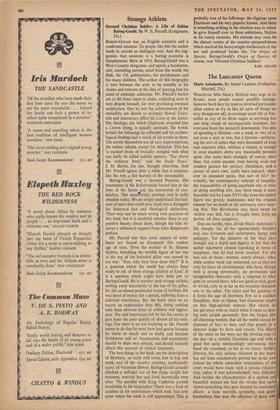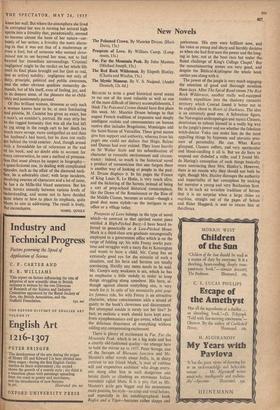The Lancaster Queen
WHATEVER Miss Nancy Mitford may urge in its favour, most people cannot possibly manage, however hard they try (and an inverted puritanism often makes us try to like all sorts of things we may disapprove of), to envisage court life at Ver- sailles in any of its three reigns as anything but one long round of incomparable boredom, for everyone from the monarch downwards. The idea of spending a lifetime—not a week or two of it, not even a year or two, but a lif dime—pert orm- ing the sort of antics that were demanded of king and courtiers alike, without a respite, is enough to send shudders down any reasonable person's spine. Our tastes have changed, of course, since then; but could anyone, even leaving aside our modern passion for privacy, cleanliness, and a corner of one's own, really have enjoyed, what- ever its attendant perks, that sort of life? In- evitably, the contemporary concept of kingship, the impossibility of going anywhere else or even of doing anything else, may have made it seem bearable; but by Louis XVI's day even the central figure was grossly inadequate, and the original reasons for so much of the ceremony were wear- ing thin. The Revolution may have swept its victims into hell, but it brought them from no farther off than purgatory.
One can hardly, then, divide Marie Antoinette's life sharply, for all her spectacularly dreadful end, into fortunate and unfortunate, happy and unhappy. Yet the disasters of her final days brought out a depth and dignity in her that the earlier lukewarm climate (speaking in terms of happiness, that is) had never touched. For she was one of those—women, nearly always—who, while neither weak nor unformed, are as they are only by force of circumstance; who have, though with a strong personality, no permanent and recognisable character, only a response to what goes on around them; who are good or bad, great- or trivial, only in so far as the occasion demands one or the other. The court and her position in it from the age of fourteen, first as a coddled Dauphine, then as Queen, had disastrous results on this high-spirited woman. Her charm let her get away with so much when it came to deal- ing with people personally that she forgot, like all charming women, that all the world cannot be disposed of face to face, and that people at a distance judge by facts and results. The effects of the court on her were not the obvious ones of the day—in a notably licentious age and with a good but quite outstandingly unromantic hus- band she remained, as far as we know, faithful (Ferson, the only serious claimant to her heart, has not been conclusively proved her lover; and indeed the whole open-door atmosphere of the court would have made such a precise relations ship, unless it was acknowledged, very difficult). And besides the characteristics of a spoiled and beautiful woman she had the virtues that make charm something that goes beyond its immediate effects: a basic warmth, sympathy, and good- heartedness that won the affection of those who knew her well. But where the atmosphere she lived in corrupted her was in turning her natural high spirits into a frivolity that, paradoxically, seemed to become almost the basis of her nature—cer- tainly of her action; a frivolity the more alarm- ing in that it was not that of a madwoman or even a fool, but of someone who seemed deter- mined not to see beyond her nose, not to feel beyond her immediate surroundings. `Criminal negligence' might be the verdict on her whole life until its final phase brought out her (just as real, just as active) nobility : negligence not only of duty, principle, political and public awareness, and the other obvious qualities monarchy de- mands, but of life itself, even of feeling, joy, and. in its deepest sense, of the pleasure she so child- ishly and passionately pursued.
Of this brilliant woman, tiresome as only such a woman knows how to be, at once fascinating and pitiable, M. Castelot has given an exact, but a man's, an outsider's, portrait. He may strip her to the ragged humanity that was all she had left to jog along in the rough cart to her death (so Much more savage, more undignified an end than her husband's had been), but he does not really get behind the vivid exterior. And, though armed With a formidable lot of references at the end of his book, and no doubt able to account for every conversation, he uses a method of presenta- tion that must always be suspect in biography— a quasi-fictional one. In dealing with complicated episodes, such as the affair of the diamond neck- lace, he is admirably clear; with large incidents, involving swarms of characters and a lot of noise, be has a de Mille-like bland assurance. But his book hovers uneasily between various levels of Understanding, and seems not to have decided quite where or how to place its emphasis, quite Whom to aim at addressing. The result is lively,































 Previous page
Previous page